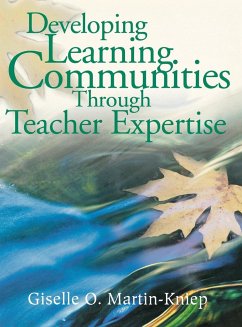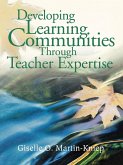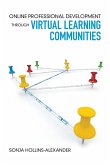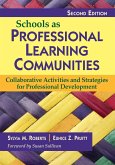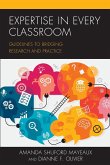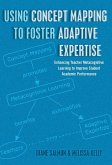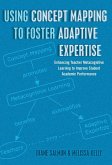Giselle O. Martin-Kniep
Developing Learning Communities Through Teacher Expertise
Giselle O. Martin-Kniep
Developing Learning Communities Through Teacher Expertise
- Gebundenes Buch
- Merkliste
- Auf die Merkliste
- Bewerten Bewerten
- Teilen
- Produkt teilen
- Produkterinnerung
- Produkterinnerung
Learn practical methods for developing a collaborative environment where teachers and administrators work together to enhance teachers' practices, increase student learning, and produce valuable school processes.
Andere Kunden interessierten sich auch für
![Developing Learning Communities Through Teacher Expertise Developing Learning Communities Through Teacher Expertise]() Giselle O. Martin-KniepDeveloping Learning Communities Through Teacher Expertise35,99 €
Giselle O. Martin-KniepDeveloping Learning Communities Through Teacher Expertise35,99 €![Online Professional Development Through Virtual Learning Communities Online Professional Development Through Virtual Learning Communities]() Sonja Hollins-AlexanderOnline Professional Development Through Virtual Learning Communities27,99 €
Sonja Hollins-AlexanderOnline Professional Development Through Virtual Learning Communities27,99 €![Schools as Professional Learning Communities Schools as Professional Learning Communities]() Schools as Professional Learning Communities43,99 €
Schools as Professional Learning Communities43,99 €![Accelerated Learning for Expertise Accelerated Learning for Expertise]() Peter HollinsAccelerated Learning for Expertise27,99 €
Peter HollinsAccelerated Learning for Expertise27,99 €![Expertise in Every Classroom Expertise in Every Classroom]() Amanda Shuford MayeauxExpertise in Every Classroom45,99 €
Amanda Shuford MayeauxExpertise in Every Classroom45,99 €![Using Concept Mapping to Foster Adaptive Expertise Using Concept Mapping to Foster Adaptive Expertise]() Diane SalmonUsing Concept Mapping to Foster Adaptive Expertise166,10 €
Diane SalmonUsing Concept Mapping to Foster Adaptive Expertise166,10 €![Using Concept Mapping to Foster Adaptive Expertise Using Concept Mapping to Foster Adaptive Expertise]() Diane SalmonUsing Concept Mapping to Foster Adaptive Expertise44,45 €
Diane SalmonUsing Concept Mapping to Foster Adaptive Expertise44,45 €-
-
-
Learn practical methods for developing a collaborative environment where teachers and administrators work together to enhance teachers' practices, increase student learning, and produce valuable school processes.
Hinweis: Dieser Artikel kann nur an eine deutsche Lieferadresse ausgeliefert werden.
Hinweis: Dieser Artikel kann nur an eine deutsche Lieferadresse ausgeliefert werden.
Produktdetails
- Produktdetails
- Verlag: Corwin
- Seitenzahl: 128
- Erscheinungstermin: 21. Oktober 2003
- Englisch
- Abmessung: 286mm x 221mm x 12mm
- Gewicht: 602g
- ISBN-13: 9780761946168
- ISBN-10: 0761946160
- Artikelnr.: 22374912
- Herstellerkennzeichnung
- Books on Demand GmbH
- In de Tarpen 42
- 22848 Norderstedt
- info@bod.de
- 040 53433511
- Verlag: Corwin
- Seitenzahl: 128
- Erscheinungstermin: 21. Oktober 2003
- Englisch
- Abmessung: 286mm x 221mm x 12mm
- Gewicht: 602g
- ISBN-13: 9780761946168
- ISBN-10: 0761946160
- Artikelnr.: 22374912
- Herstellerkennzeichnung
- Books on Demand GmbH
- In de Tarpen 42
- 22848 Norderstedt
- info@bod.de
- 040 53433511
Giselle Martin-Kniep is a teacher educator, researcher, program evaluator, and writer. She is the President of Learner-Centered Initiatives, Ltd., an educational consulting organization specializing in comprehensive regional and school-based curriculum and assessment work. She is also the CEO of the Center for the Study of Expertise in Teaching and Learning, an organization committed to the discovery and dissemination of teacher expertise. Dr. Martin-Kniep has a strong background in organizational change and has graduate degrees in communication and development, social sciences in education, and educational evaluation from Stanford University. She has taught at Adelphi University, the University of British Columbia, and the University of Victoria. In the last fourteen years, she has worked with hundreds of schools and districts nationally and internationally in the areas of alternative assessment, standards-based design, school change, and action research. Dr. Martin-Kniep has written extensively. Her most recent books are Why Am I Doing This: Purposeful Teaching with Portfolio Assessment, published by Heinemann; Capturing the Wisdom of Practice: Portfolios for Teachers and Administrators; and Becoming a Better Teacher: Eight Innovations that Work both published by ASCD.
Preface
Acknowledgments
About the Author
1. Learning Communities
What Are Learning Communities?
Why Are They Important?
What Do Learning Communities Do? What do They Require to Function?
What Gets in the Way of the Development of Learning Communities?
What Can We Do to Support Learning Communities?
Possible Questions for the Reader
Recommended Books on Learning Communities
2. Standards-Based Curriculum and Assessment Design
What Does It Take to Develop a Standards-Based, Learner-Centered Unit?
How Do We Help Teachers Develop High-Quality Standards-Based Units?
Possible Questions for the Reader
Recommended Books on Standards-Based Curriculum and Assessment Design
3. Data-Driven Inquiry and Action Research
Three Examples of Inquiry
How Can Schools Support Individual, Collaborative, and School-Based
Research?
Possible Questions for the Reader
Recommended Books on Action Research and Use of Data
4. Professional Portfolios
What Do Professional Portfolios Include?
Understanding and Use of Standards-Based and Learner-Centered Curriculum
and Assessment
Use of Reflection and Data to Improve One¿s Practice
How Are Professional Portfolios Organized?
How Can Schools Begin to Support the Development and Use of Professional
Portfolios?
Possible Questions for the Reader
Recommended Books on Portfolios
5. Developing an Action Plan
Identification of Internal Expertise
Assessment of Needs
Brokering of Relationships Among Teachers
Curriculum and Assessment Design Work
Inquiry and Analysis Work
Professional Portfolio Work
Appendix A: Description of CSETL and Its Mission
Appendix B: Unit Design Template
Appendix C: Application to Become a CSETL Fellow
Appendix D: Professional Portfolio Rubric
References
Index
Acknowledgments
About the Author
1. Learning Communities
What Are Learning Communities?
Why Are They Important?
What Do Learning Communities Do? What do They Require to Function?
What Gets in the Way of the Development of Learning Communities?
What Can We Do to Support Learning Communities?
Possible Questions for the Reader
Recommended Books on Learning Communities
2. Standards-Based Curriculum and Assessment Design
What Does It Take to Develop a Standards-Based, Learner-Centered Unit?
How Do We Help Teachers Develop High-Quality Standards-Based Units?
Possible Questions for the Reader
Recommended Books on Standards-Based Curriculum and Assessment Design
3. Data-Driven Inquiry and Action Research
Three Examples of Inquiry
How Can Schools Support Individual, Collaborative, and School-Based
Research?
Possible Questions for the Reader
Recommended Books on Action Research and Use of Data
4. Professional Portfolios
What Do Professional Portfolios Include?
Understanding and Use of Standards-Based and Learner-Centered Curriculum
and Assessment
Use of Reflection and Data to Improve One¿s Practice
How Are Professional Portfolios Organized?
How Can Schools Begin to Support the Development and Use of Professional
Portfolios?
Possible Questions for the Reader
Recommended Books on Portfolios
5. Developing an Action Plan
Identification of Internal Expertise
Assessment of Needs
Brokering of Relationships Among Teachers
Curriculum and Assessment Design Work
Inquiry and Analysis Work
Professional Portfolio Work
Appendix A: Description of CSETL and Its Mission
Appendix B: Unit Design Template
Appendix C: Application to Become a CSETL Fellow
Appendix D: Professional Portfolio Rubric
References
Index
Preface
Acknowledgments
About the Author
1. Learning Communities
What Are Learning Communities?
Why Are They Important?
What Do Learning Communities Do? What do They Require to Function?
What Gets in the Way of the Development of Learning Communities?
What Can We Do to Support Learning Communities?
Possible Questions for the Reader
Recommended Books on Learning Communities
2. Standards-Based Curriculum and Assessment Design
What Does It Take to Develop a Standards-Based, Learner-Centered Unit?
How Do We Help Teachers Develop High-Quality Standards-Based Units?
Possible Questions for the Reader
Recommended Books on Standards-Based Curriculum and Assessment Design
3. Data-Driven Inquiry and Action Research
Three Examples of Inquiry
How Can Schools Support Individual, Collaborative, and School-Based
Research?
Possible Questions for the Reader
Recommended Books on Action Research and Use of Data
4. Professional Portfolios
What Do Professional Portfolios Include?
Understanding and Use of Standards-Based and Learner-Centered Curriculum
and Assessment
Use of Reflection and Data to Improve One¿s Practice
How Are Professional Portfolios Organized?
How Can Schools Begin to Support the Development and Use of Professional
Portfolios?
Possible Questions for the Reader
Recommended Books on Portfolios
5. Developing an Action Plan
Identification of Internal Expertise
Assessment of Needs
Brokering of Relationships Among Teachers
Curriculum and Assessment Design Work
Inquiry and Analysis Work
Professional Portfolio Work
Appendix A: Description of CSETL and Its Mission
Appendix B: Unit Design Template
Appendix C: Application to Become a CSETL Fellow
Appendix D: Professional Portfolio Rubric
References
Index
Acknowledgments
About the Author
1. Learning Communities
What Are Learning Communities?
Why Are They Important?
What Do Learning Communities Do? What do They Require to Function?
What Gets in the Way of the Development of Learning Communities?
What Can We Do to Support Learning Communities?
Possible Questions for the Reader
Recommended Books on Learning Communities
2. Standards-Based Curriculum and Assessment Design
What Does It Take to Develop a Standards-Based, Learner-Centered Unit?
How Do We Help Teachers Develop High-Quality Standards-Based Units?
Possible Questions for the Reader
Recommended Books on Standards-Based Curriculum and Assessment Design
3. Data-Driven Inquiry and Action Research
Three Examples of Inquiry
How Can Schools Support Individual, Collaborative, and School-Based
Research?
Possible Questions for the Reader
Recommended Books on Action Research and Use of Data
4. Professional Portfolios
What Do Professional Portfolios Include?
Understanding and Use of Standards-Based and Learner-Centered Curriculum
and Assessment
Use of Reflection and Data to Improve One¿s Practice
How Are Professional Portfolios Organized?
How Can Schools Begin to Support the Development and Use of Professional
Portfolios?
Possible Questions for the Reader
Recommended Books on Portfolios
5. Developing an Action Plan
Identification of Internal Expertise
Assessment of Needs
Brokering of Relationships Among Teachers
Curriculum and Assessment Design Work
Inquiry and Analysis Work
Professional Portfolio Work
Appendix A: Description of CSETL and Its Mission
Appendix B: Unit Design Template
Appendix C: Application to Become a CSETL Fellow
Appendix D: Professional Portfolio Rubric
References
Index

